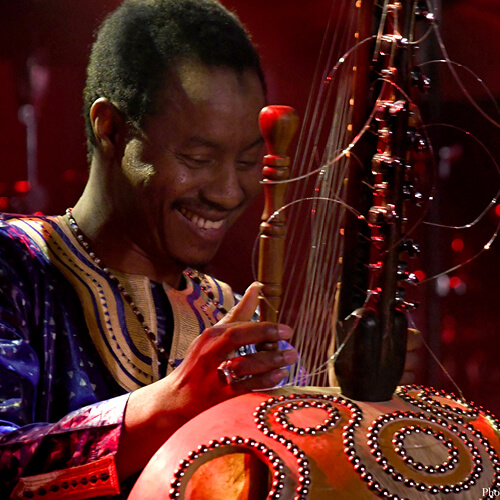It seems that from his birth in Mali, Diely Mori Tounkara was destined to become a musician, a great musician. Thanks to his father, a seasoned kora player, he learned to play this instrument and also followed the teachings of his own brother, Djeli Mady Tounkara, an internationally recognized guitarist and soloist of the Super Rail-Band of Bamako.
His compositions combine his mastery of many traditional Mandingo pieces with a more contemporary personal repertoire. Thanks to the versatility of his playing and his great technical mastery, he carries the magic of his kora into musical styles other than African music, and collaborates with many artists in Montreal, Quebec and Toronto, such as Paul Andy, Laetitia Zonzambé, Prophète du Malheur, Alexandre Éthier, Wonny Song, Élage Diouf, Tapa Diarra and Aboulaye Koné.
In 2007, he moved to Montreal and joined the group Taafé Fanga with whom he recorded the album Tamala in 2012, as well as the collective Kabakuwo, winner of the Syli D’Or 2010 de la musique du monde and whose first album, Malongtin, was released in 2011.
In 2012, the artist created an artistic group with Estelle Lavoie, the Tounkara-Lavoie, which combines original creations and traditional music, kora and guitar. The success is there: Prix coup de coeur from the Conseil des arts de Montréal, Ici Musique and the diversity office of Radio-Canada during the Vitrines de musiques locales métissées 2013 and 2014, as well as the 2014 Diversity Award (Conseil des arts de Montréal, Vision Diversité, MAI and Place des Arts).
Today, in addition to his professional career, he passes on the techniques of the kora, guitar and sabar to young Quebecers. He regularly puts his talent and his knowledge of traditional instruments and music at the service of the greatest, in Mali as well as in Senegal, among whom Kerfala Kanté, Mangala Camara, Saramba Kouyaté or Yaye Kanouté.
After a notable appearance at MUZ, he presents in the intimacy of the small Outremont, his very first personal creation surrounded by his musicians in November 2019, as part of the Mardis métissés Series. The unanimous success highlights his ability to draw the audience into the heart of a crossbreeding drawing on Afro-Brazilian, jazz and Latin influences while carefully keeping the kora at the heart of his artistic approach.




